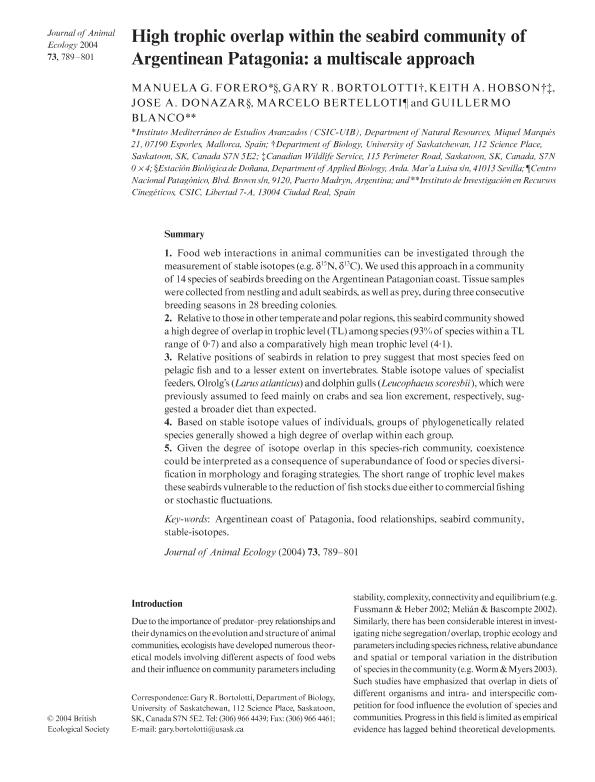Mostrar el registro sencillo del ítem
dc.contributor.author
Forero, Manuela G.
dc.contributor.author
Bortolotti, Gary R.
dc.contributor.author
Hobson, Keith A.
dc.contributor.author
Donazar, Jose A.
dc.contributor.author
Bertellotti, Néstor Marcelo

dc.contributor.author
Blanco, Guillermo

dc.date.available
2017-11-24T17:14:42Z
dc.date.issued
2004-06-26
dc.identifier.citation
Forero, Manuela G.; Bortolotti, Gary R.; Hobson, Keith A.; Donazar, Jose A.; Bertellotti, Néstor Marcelo; et al.; High trophic overlap within the seabird community of Argentinean Patagonia: a multiscale approach; Wiley; Journal Of Animal Ecology; 73; 4; 26-6-2004; 789-801
dc.identifier.issn
0021-8790
dc.identifier.uri
http://hdl.handle.net/11336/29001
dc.description.abstract
1. Food web interactions in animal communities can be investigated through the measurement of stable isotopes (e.g. δ15N, δ13C). We used this approach in a community of 14 species of seabirds breeding on the Argentinean Patagonian coast. Tissue samples were collected from nestling and adult seabirds, as well as prey, during three consecutive breeding seasons in 28 breeding colonies. 2. Relative to those in other temperate and polar regions, this seabird community showed a high degree of overlap in trophic level (TL) among species (93% of species within a TL range of 0·7) and also a comparatively high mean trophic level (4·1). 3. Relative positions of seabirds in relation to prey suggest that most species feed on pelagic fish and to a lesser extent on invertebrates. Stable isotope values of specialist feeders, Olrolg’s (Larus atlanticus) and dolphin gulls (Leucophaeus scoresbii), which were previously assumed to feed mainly on crabs and sea lion excrement, respectively, suggested a broader diet than expected. 4. Based on stable isotope values of individuals, groups of phylogenetically related species generally showed a high degree of overlap within each group. 5. Given the degree of isotope overlap in this species-rich community, coexistence could be interpreted as a consequence of superabundance of food or species diversification in morphology and foraging strategies. The short range of trophic level makes these seabirds vulnerable to the reduction of fish stocks due either to commercial fishing or stochastic fluctuations.
dc.format
application/pdf
dc.language.iso
eng
dc.publisher
Wiley

dc.rights
info:eu-repo/semantics/openAccess
dc.rights.uri
https://creativecommons.org/licenses/by-nc-sa/2.5/ar/
dc.subject
Argentinean Coast of Patagonia
dc.subject
Food Relationships
dc.subject
Seabird Community
dc.subject
Stable-Isotopes
dc.subject.classification
Otras Ciencias Biológicas

dc.subject.classification
Ciencias Biológicas

dc.subject.classification
CIENCIAS NATURALES Y EXACTAS

dc.title
High trophic overlap within the seabird community of Argentinean Patagonia: a multiscale approach
dc.type
info:eu-repo/semantics/article
dc.type
info:ar-repo/semantics/artículo
dc.type
info:eu-repo/semantics/publishedVersion
dc.date.updated
2017-11-03T20:02:41Z
dc.journal.volume
73
dc.journal.number
4
dc.journal.pagination
789-801
dc.journal.pais
Estados Unidos

dc.journal.ciudad
Hoboken
dc.description.fil
Fil: Forero, Manuela G.. Instituto Mediterráneo de Estudios Avanzados; España. Estación Biológica de Doñana; España
dc.description.fil
Fil: Bortolotti, Gary R.. University Of Saskatchewan; Canadá
dc.description.fil
Fil: Hobson, Keith A.. University Of Saskatchewan; Canadá
dc.description.fil
Fil: Donazar, Jose A.. Estación Biológica de Doñana; España
dc.description.fil
Fil: Bertellotti, Néstor Marcelo. Consejo Nacional de Investigaciones Científicas y Técnicas. Centro Científico Tecnológico Conicet - Centro Nacional Patagónico; Argentina
dc.description.fil
Fil: Blanco, Guillermo. Instituto de Investigación en Recursos Cinegéticos; España
dc.journal.title
Journal Of Animal Ecology

dc.relation.alternativeid
info:eu-repo/semantics/altIdentifier/doi/http://dx.doi.org/10.1111/j.0021-8790.2004.00852.x
dc.relation.alternativeid
info:eu-repo/semantics/altIdentifier/url/http://onlinelibrary.wiley.com/doi/10.1111/j.0021-8790.2004.00852.x/abstract
Archivos asociados
